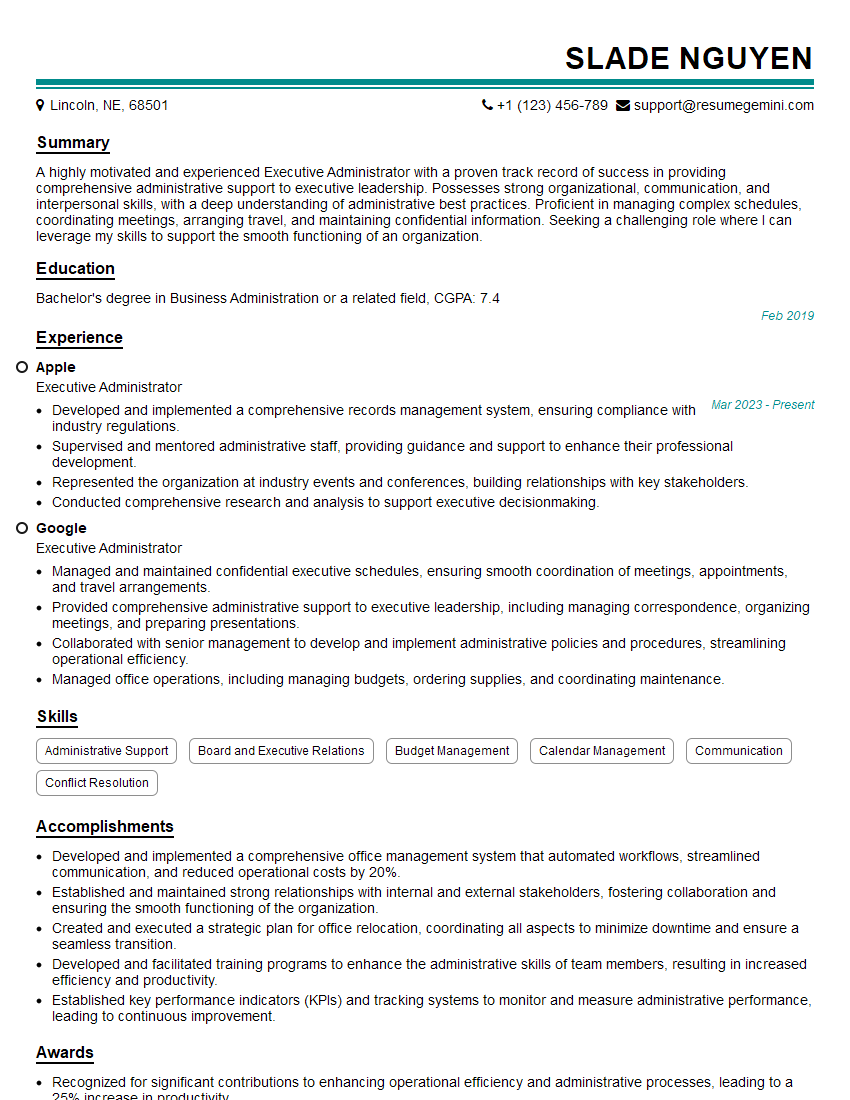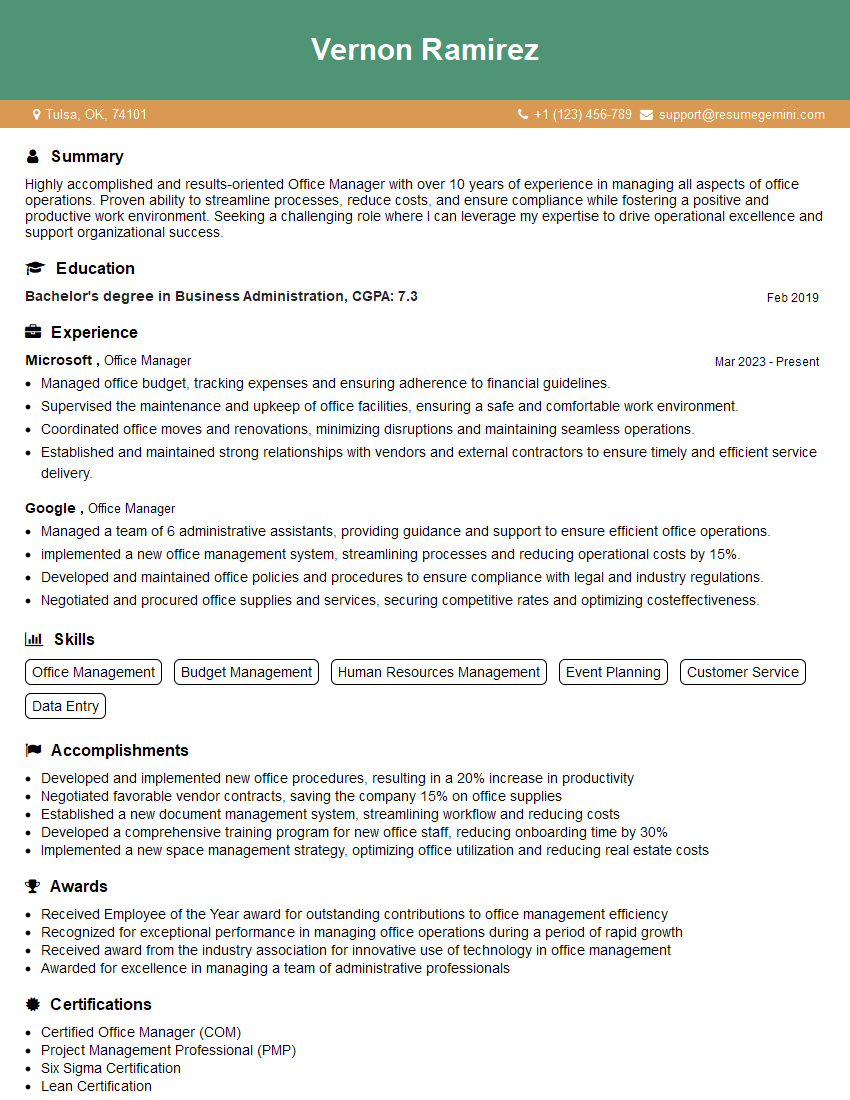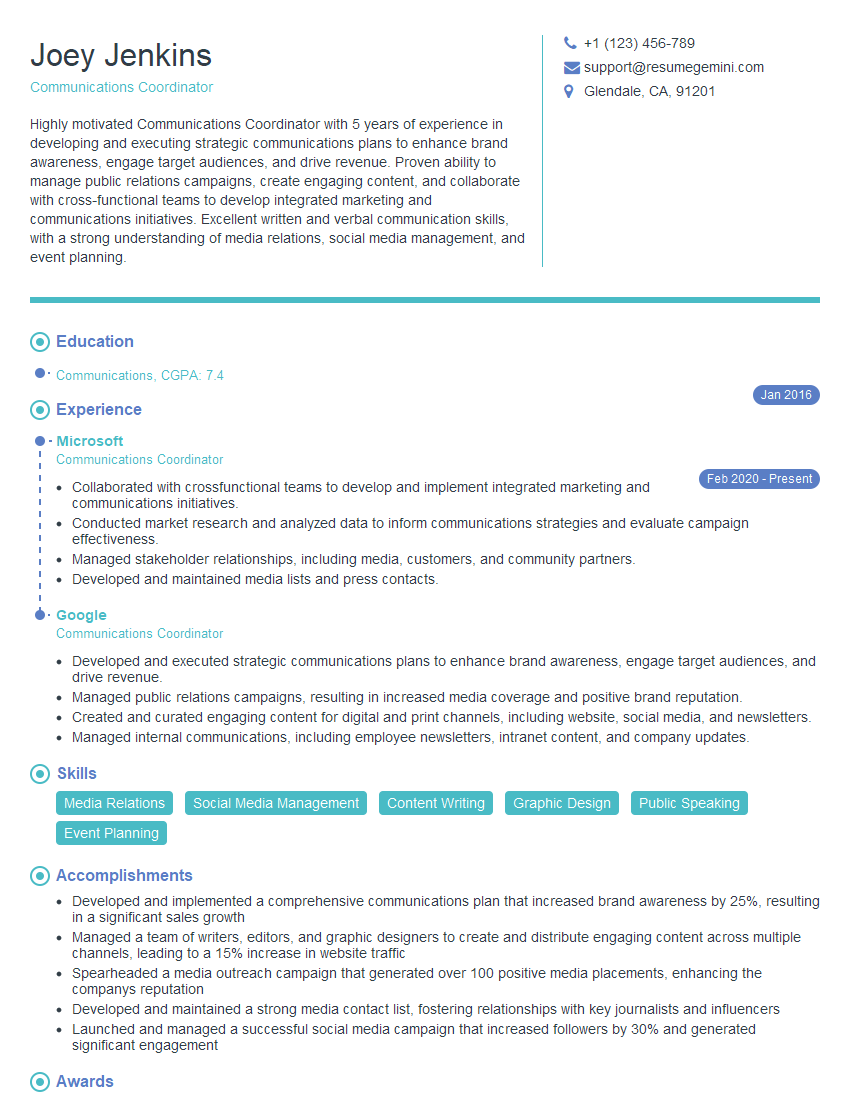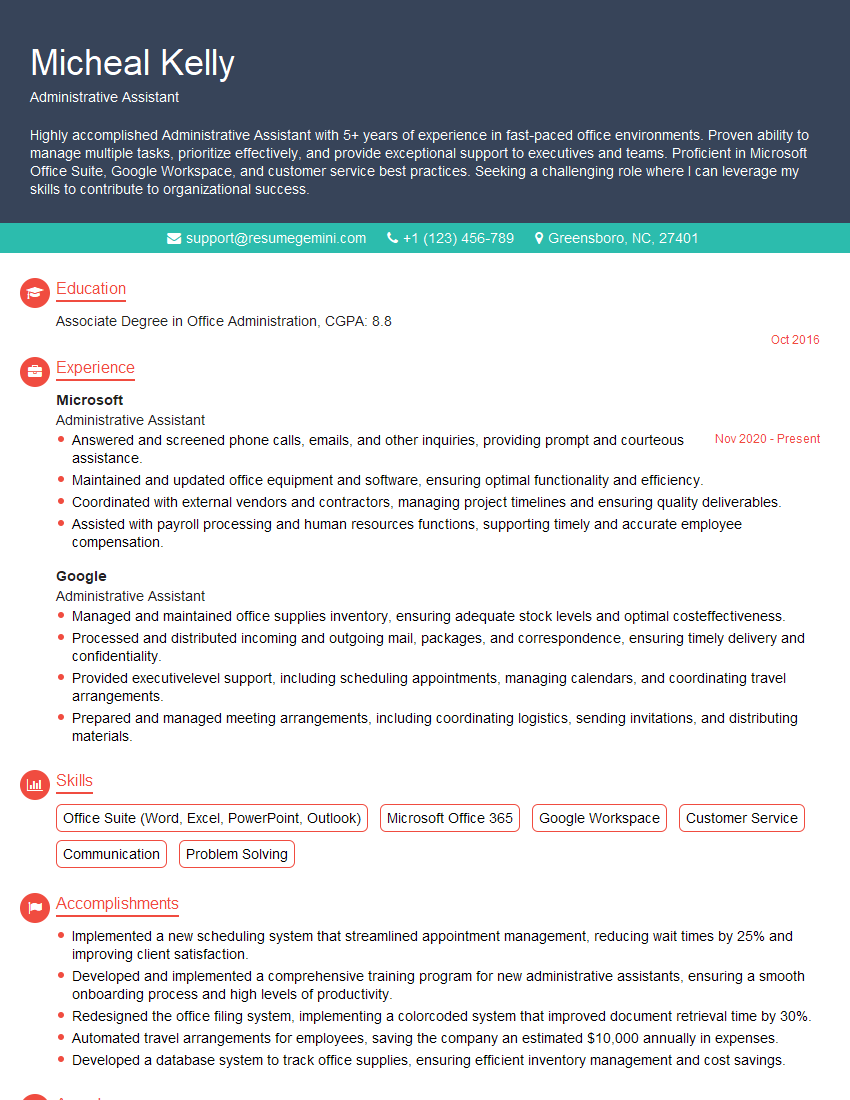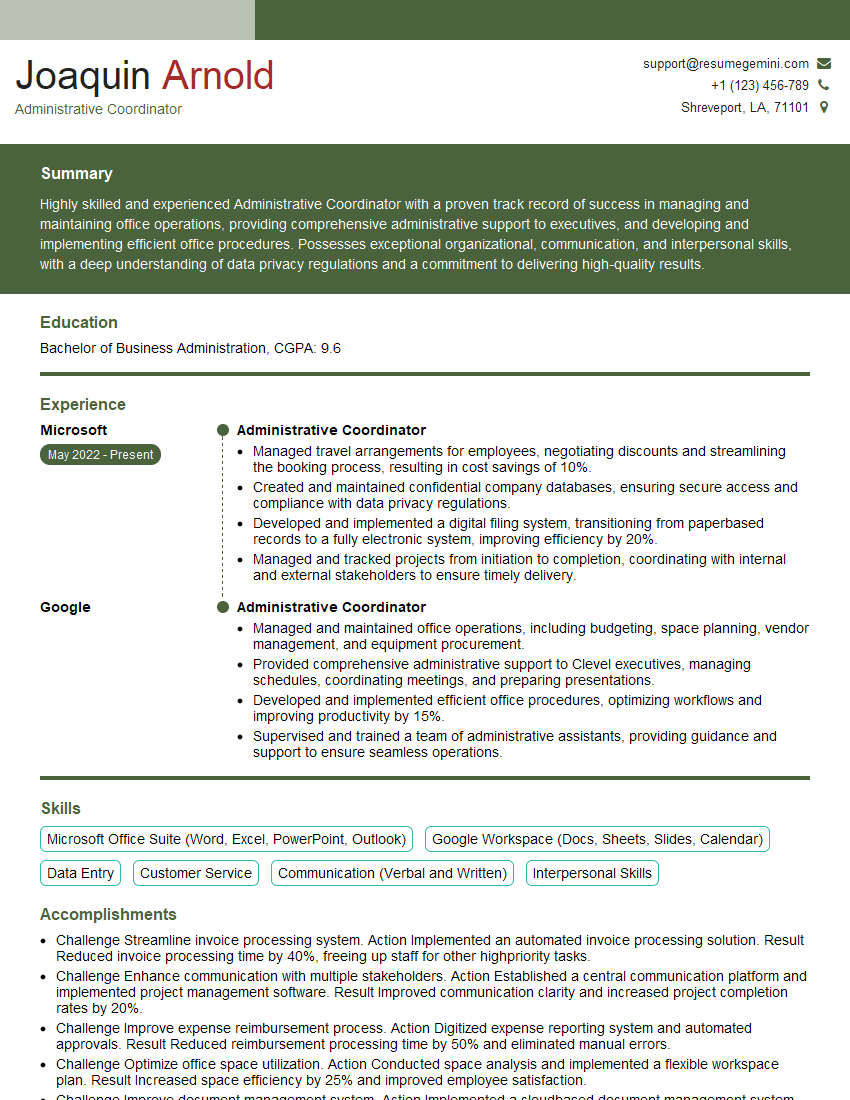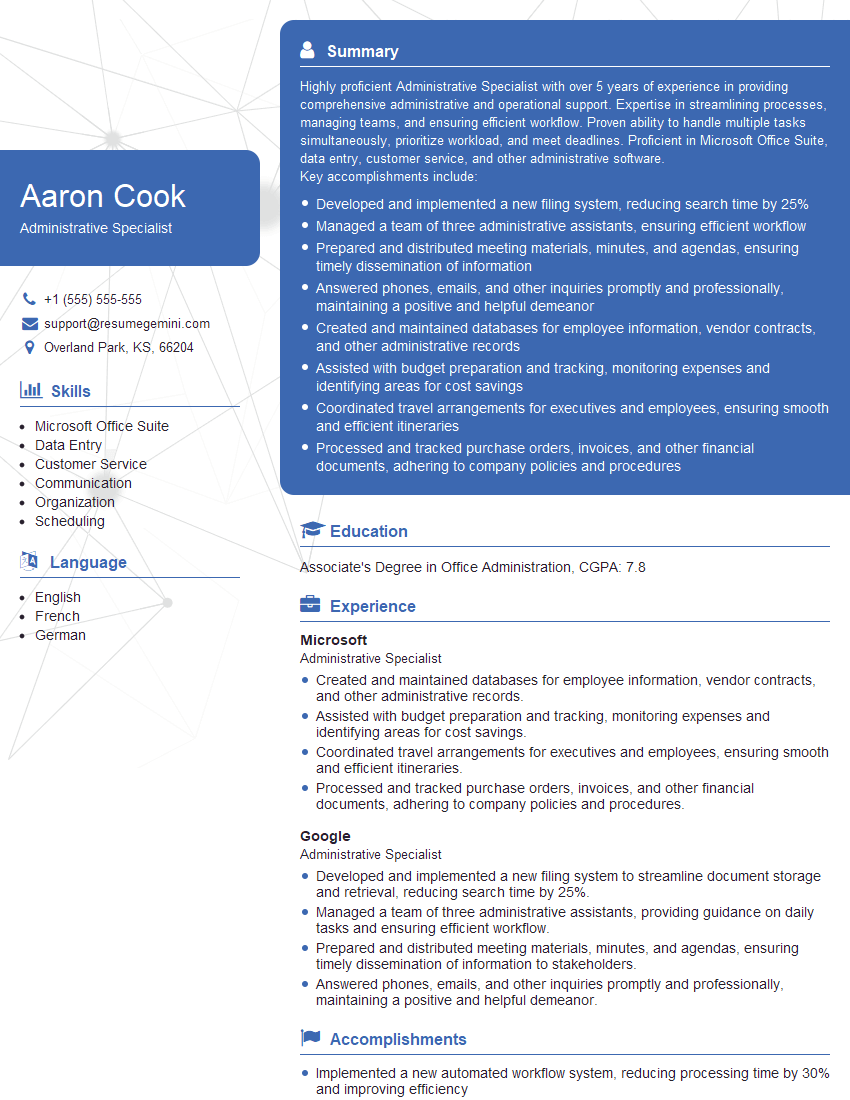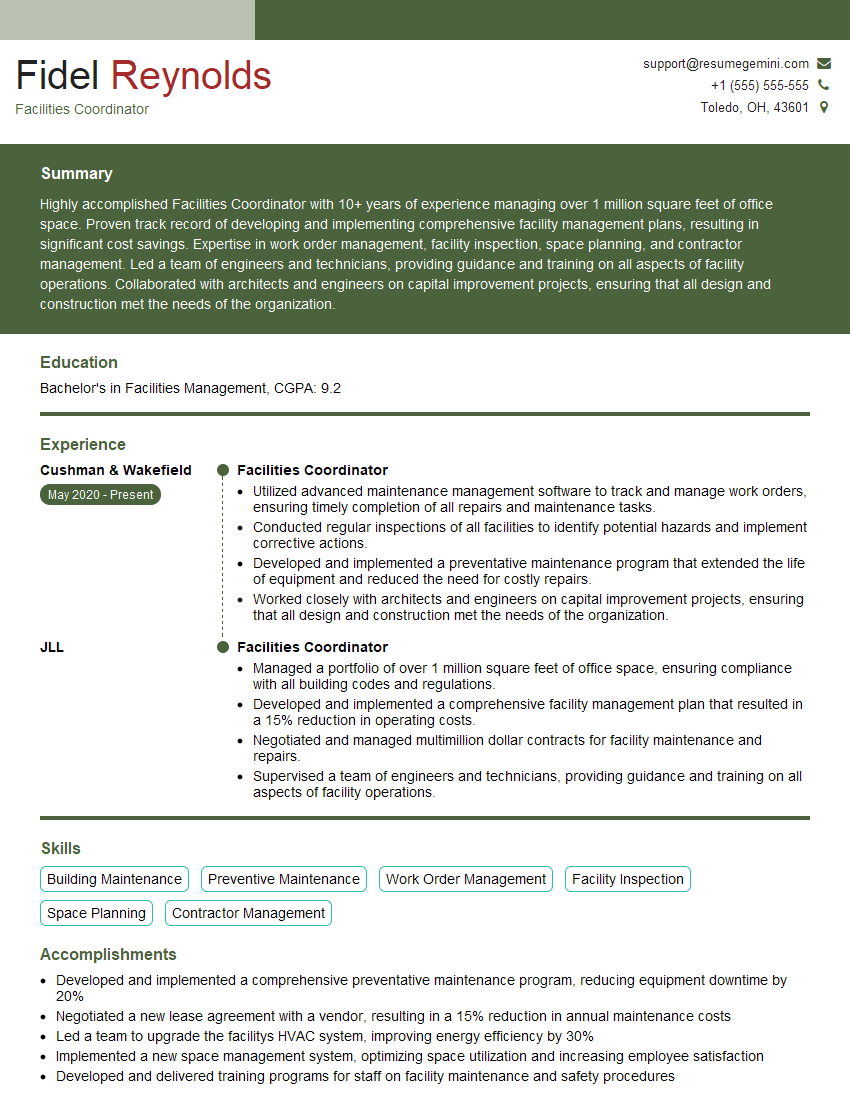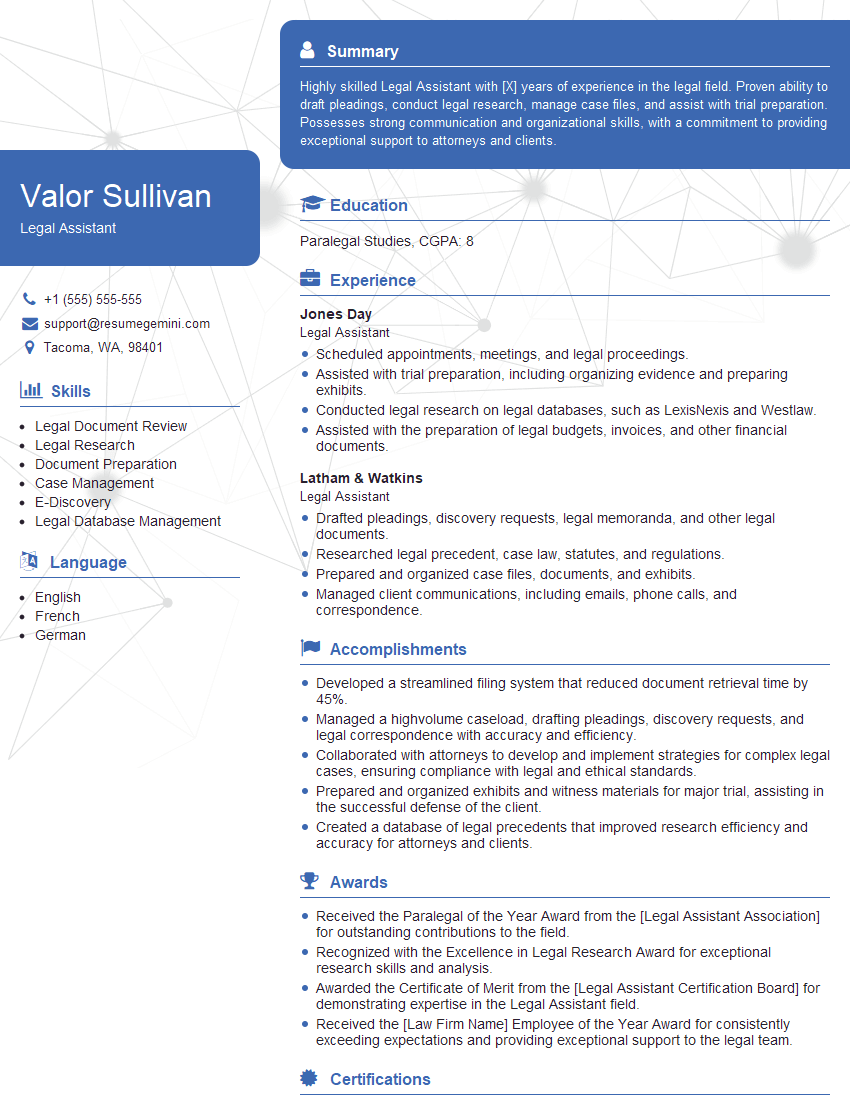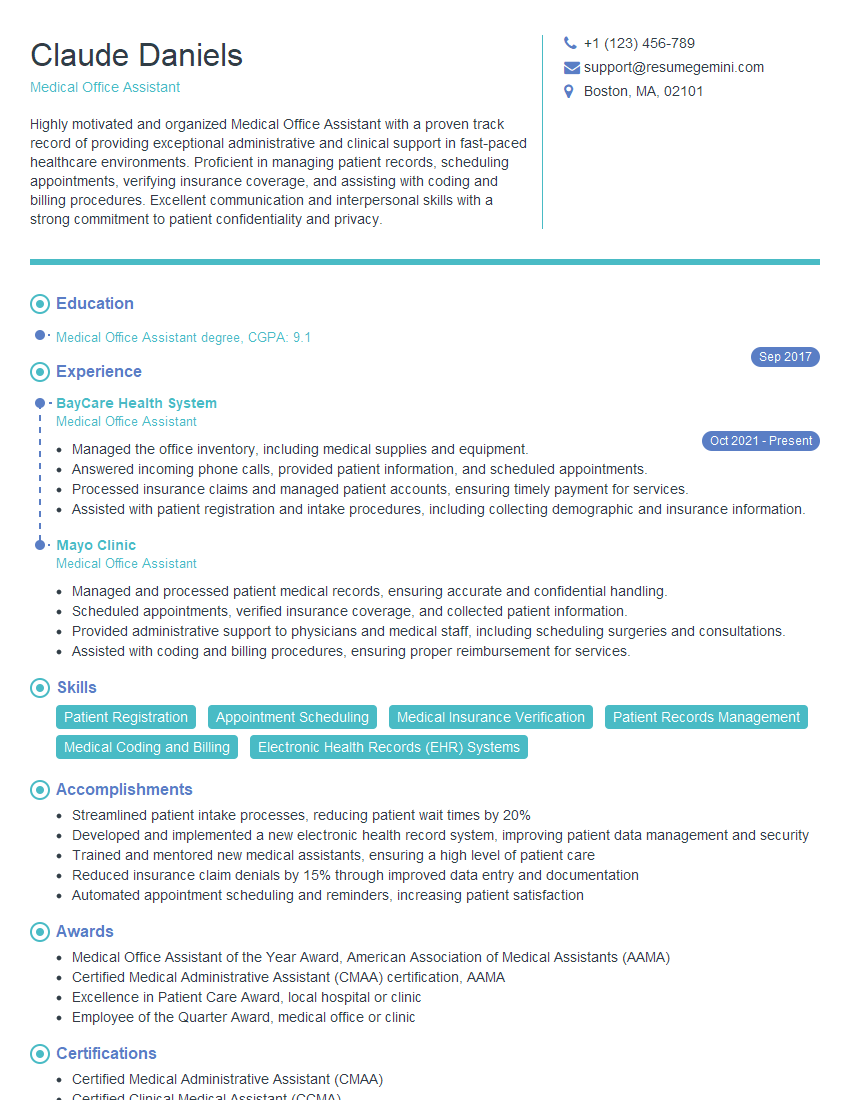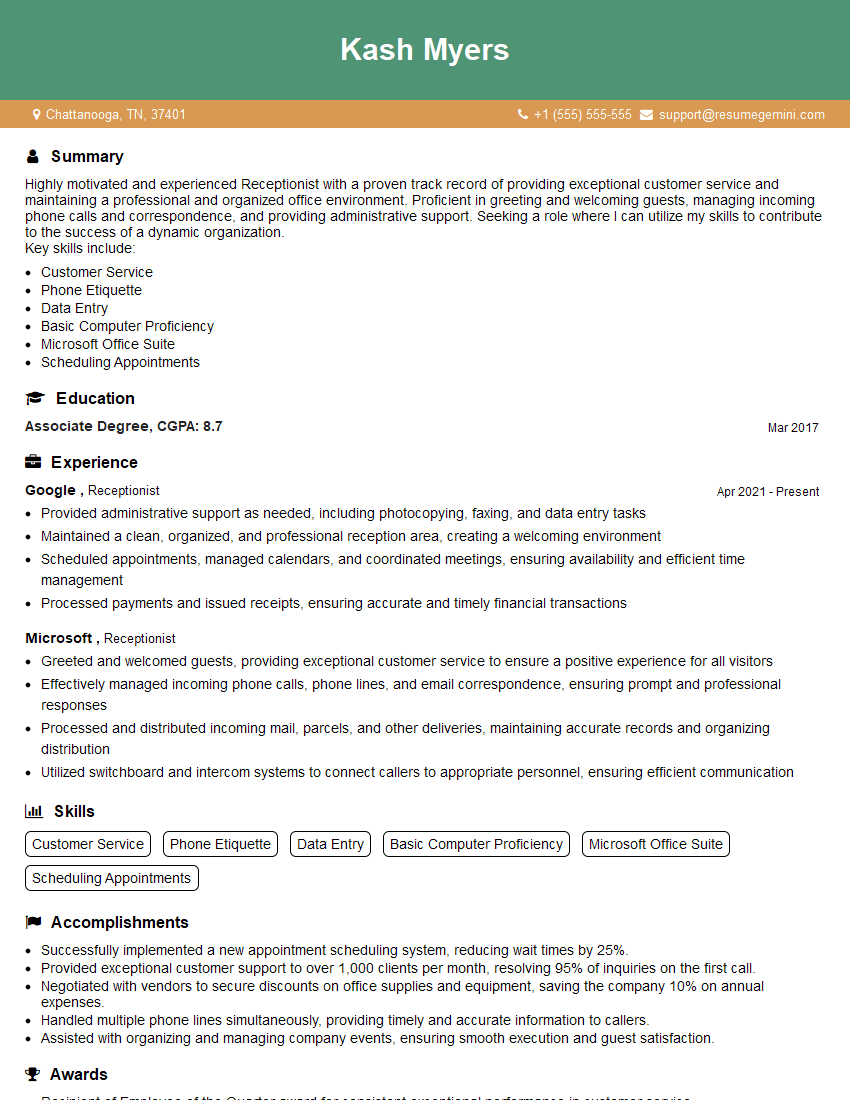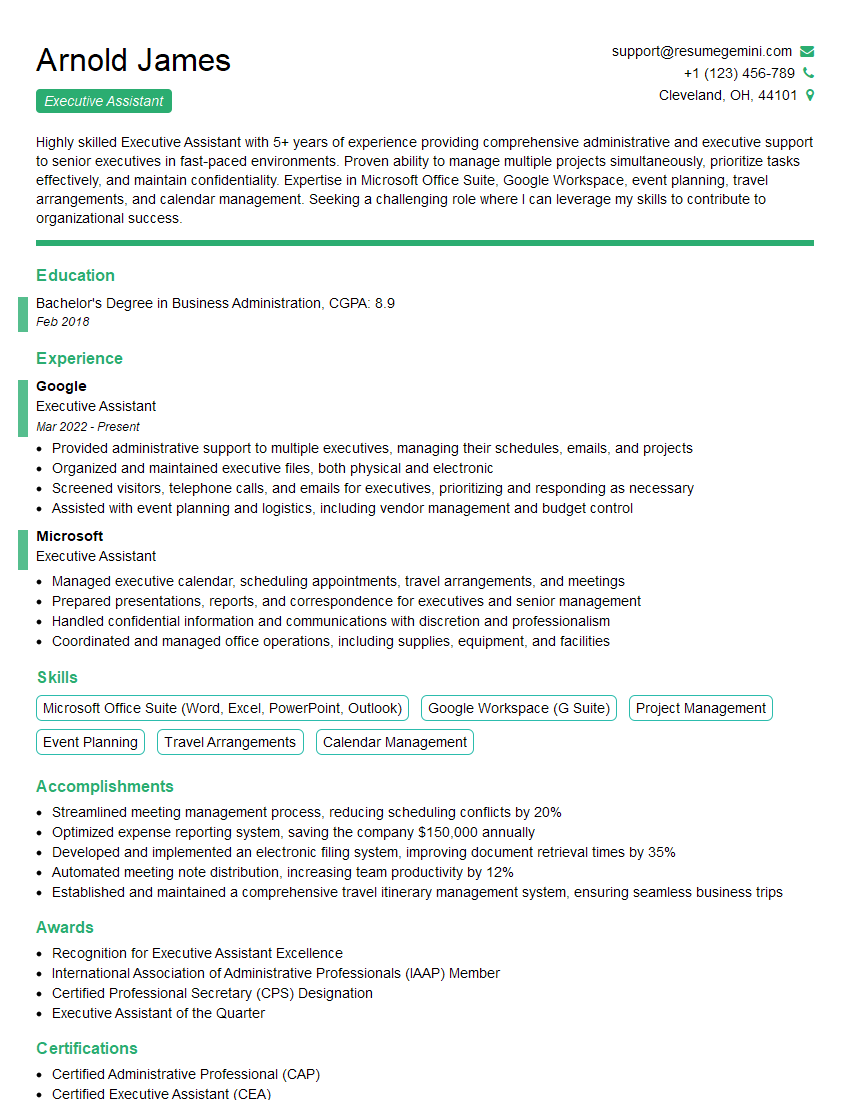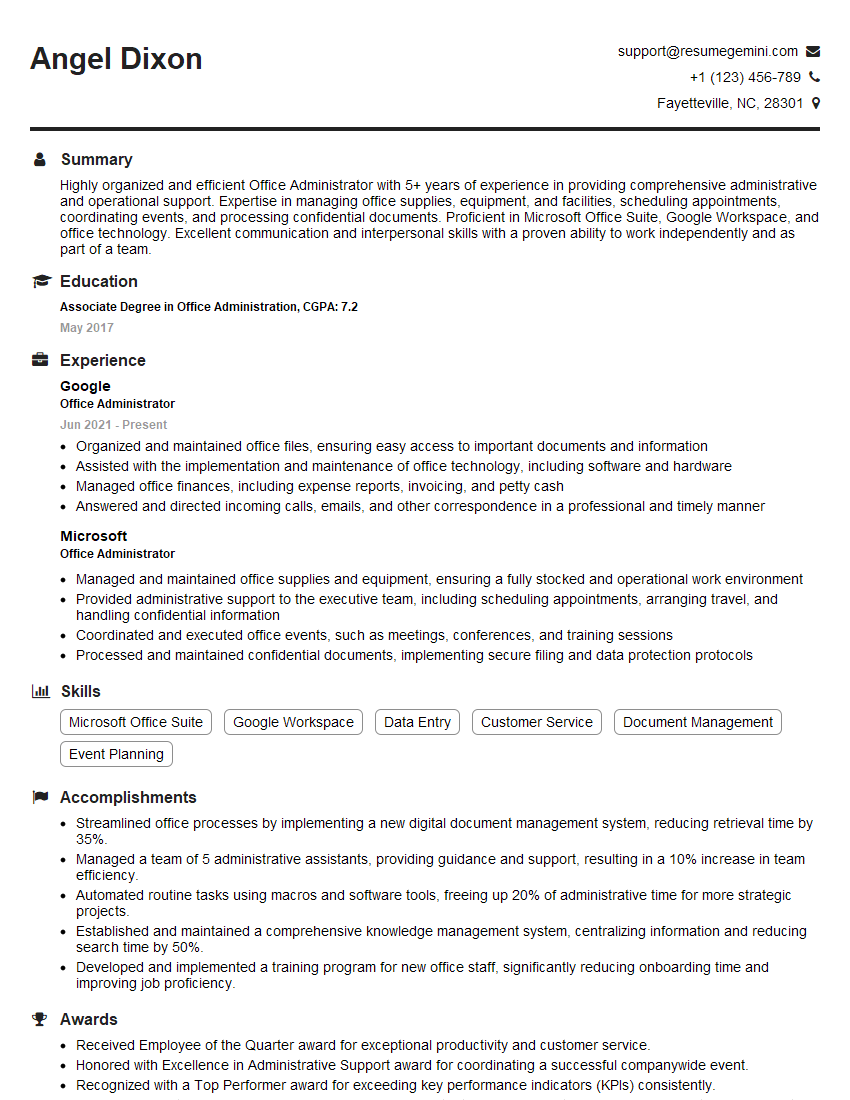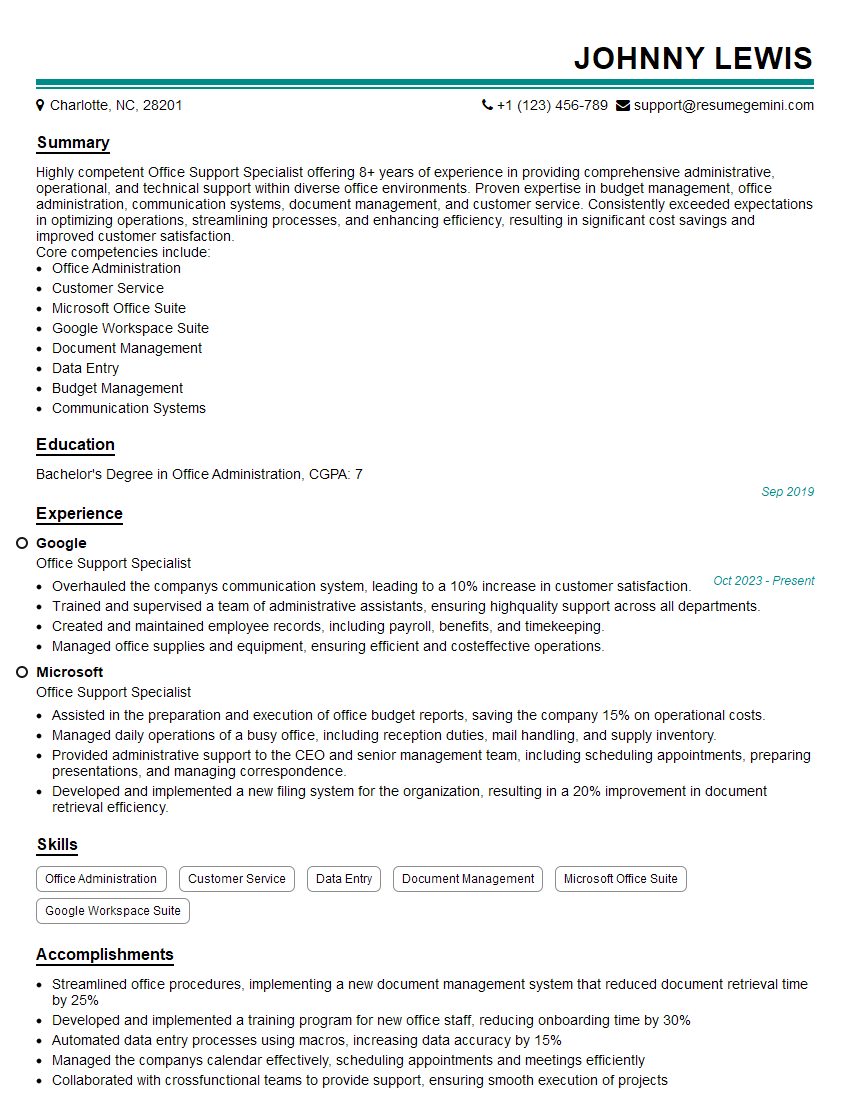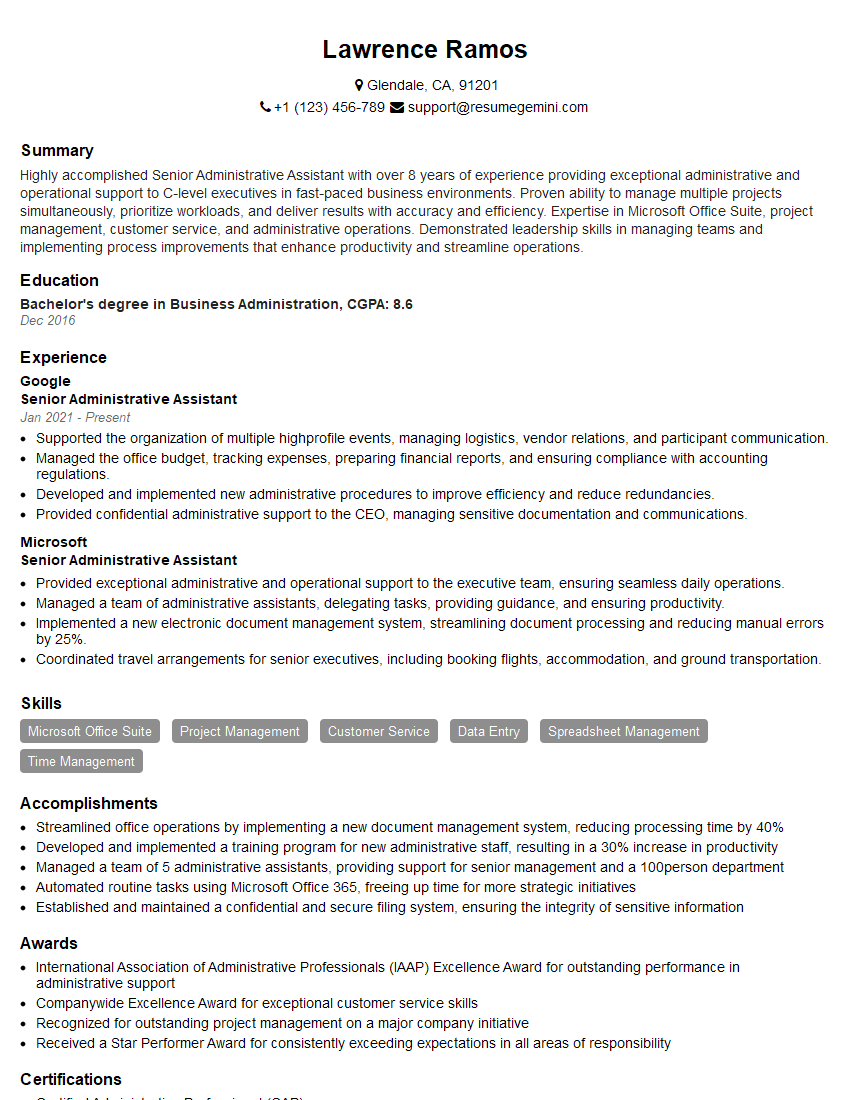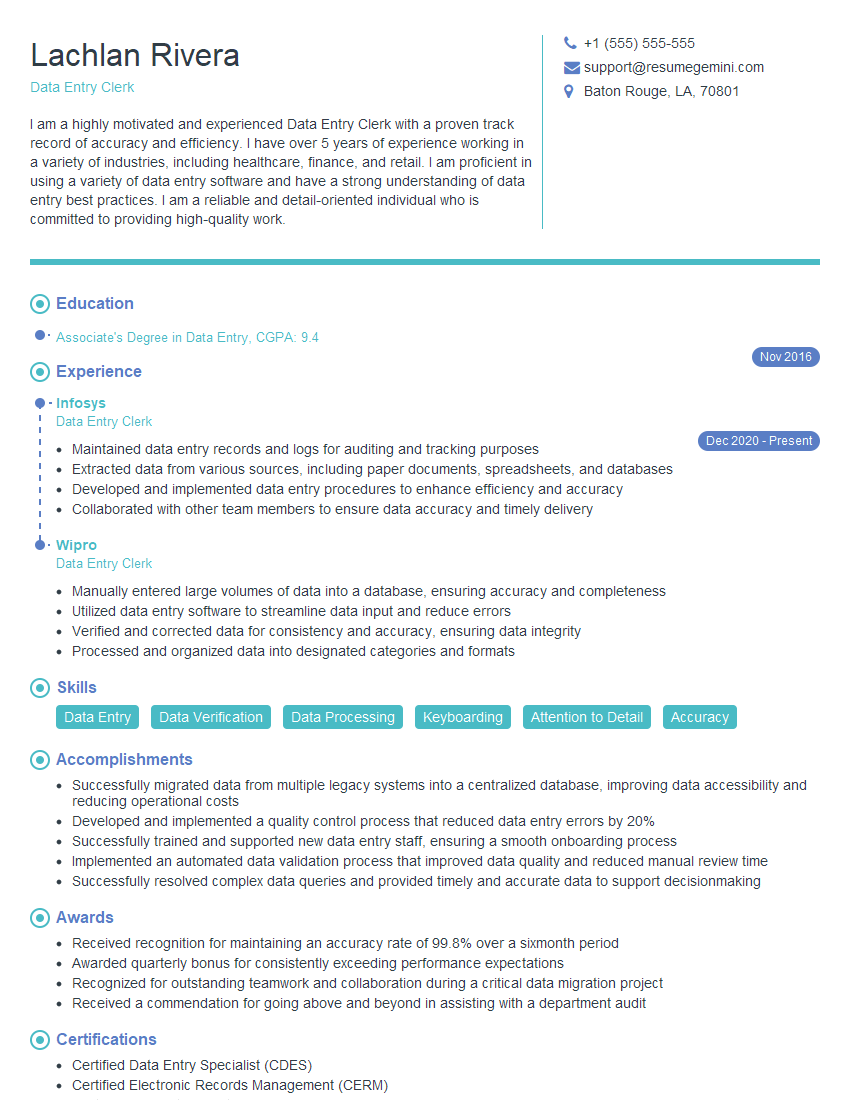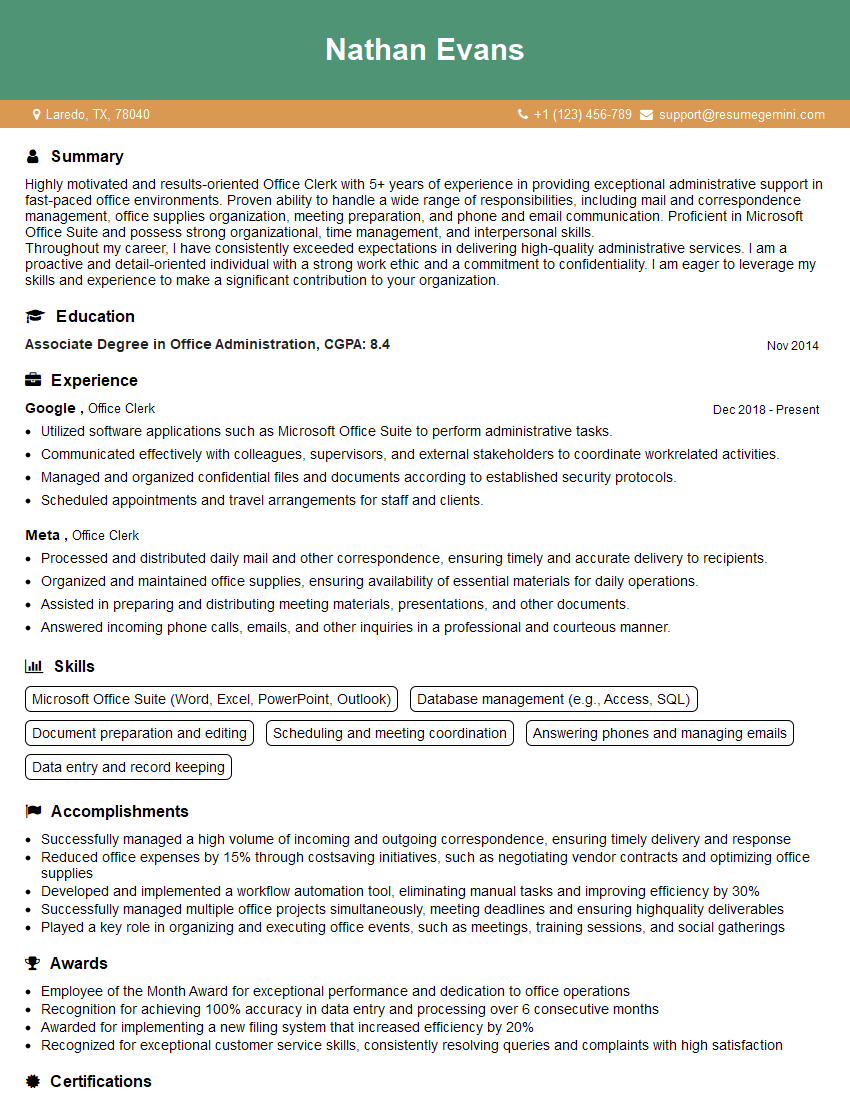The right preparation can turn an interview into an opportunity to showcase your expertise. This guide to Assist with Office Administration and Management interview questions is your ultimate resource, providing key insights and tips to help you ace your responses and stand out as a top candidate.
Questions Asked in Assist with Office Administration and Management Interview
Q 1. What software programs are you proficient in (e.g., Microsoft Office Suite, Google Workspace)?
My proficiency in software programs extends across the Microsoft Office Suite (Word, Excel, PowerPoint, Outlook) and Google Workspace (Docs, Sheets, Slides, Gmail, Calendar). I’m highly skilled in utilizing these tools for various administrative tasks. For example, in my previous role, I used Excel to create complex spreadsheets for tracking project budgets and generating reports, leveraging pivot tables and formulas for efficient data analysis. In another instance, I utilized Google Workspace to collaborate with remote team members on shared documents, using version control features to ensure accuracy and efficiency.
Beyond these core suites, I also possess experience with project management software like Asana and Trello, and CRM systems such as Salesforce, which are all invaluable for streamlining workflows and improving overall office efficiency. I’m a quick learner and adapt easily to new software as needed.
Q 2. Describe your experience with scheduling appointments and managing calendars.
Scheduling and calendar management are crucial aspects of my role, and I excel at coordinating complex schedules. My approach involves understanding individual priorities, considering time zones (when working with international teams), and anticipating potential conflicts. I utilize both Outlook and Google Calendar extensively, employing color-coding and reminders to ensure no appointments are missed. For instance, in my prior role, I managed the calendars for five executives, successfully coordinating meetings, travel arrangements, and other time-sensitive engagements with minimal conflicts. My meticulous approach minimizes scheduling clashes and maximizes productivity.
I frequently use the ‘recurring appointment’ feature in calendar software to streamline repetitive meetings. Furthermore, I proactively communicate schedule changes to all relevant parties, ensuring transparency and preventing misunderstandings. This proactive approach fosters smooth workflow and strengthens communication within the team.
Q 3. How do you prioritize tasks and manage your time effectively in a busy office environment?
In a busy office environment, effective task prioritization and time management are paramount. I employ several strategies, including the Eisenhower Matrix (urgent/important), which helps me categorize tasks and focus on high-impact activities. I also utilize to-do lists, breaking down large tasks into smaller, manageable steps. This allows me to track progress, celebrate small wins, and maintain a sense of control, even during periods of high pressure.
Time blocking is another technique I frequently use. By allocating specific time slots for particular tasks, I can better manage my time and avoid multitasking, leading to higher quality work and improved focus. For example, I might dedicate the morning to focused work requiring deep concentration, and the afternoon to responding to emails and attending meetings. Regularly reviewing my schedule and adjusting my approach as needed is crucial to maintaining this system’s effectiveness.
Q 4. What is your experience with handling confidential information?
Handling confidential information is a critical responsibility that I take very seriously. I am adept at maintaining the strictest confidentiality, adhering to company policies and regulations regarding data privacy. This includes securely storing sensitive documents, both physically and digitally, using password-protected files and employing secure data storage practices. I never discuss confidential information with unauthorized individuals and always ensure sensitive materials are handled with utmost discretion. I fully understand the potential consequences of a breach and act accordingly.
For example, I’ve managed sensitive employee data, client information, and financial records, adhering to all relevant privacy laws and company regulations, like GDPR or HIPAA, depending on the context. I am always aware of the importance of data security and take proactive measures to ensure protection.
Q 5. How do you handle multiple competing priorities?
Juggling multiple competing priorities often requires a strategic and organized approach. I prioritize tasks based on urgency and impact, utilizing the methods previously mentioned like the Eisenhower Matrix. I also communicate proactively with stakeholders, setting clear expectations and managing their expectations, as well as my own. This helps ensure that everyone is informed and understands the prioritization process. Sometimes, it’s necessary to politely push back on less critical requests if it means compromising higher-priority tasks. This requires strong communication skills and the ability to explain the reasoning behind the prioritization choices.
For example, if I’m faced with a tight deadline for a critical report and a less urgent request, I will communicate this to the individual making the request, explaining the current priorities and offering an alternative timeline. Open and honest communication is key to navigating these situations effectively.
Q 6. Describe your experience with data entry and record keeping.
My experience with data entry and record-keeping is extensive. I’m proficient in accurately and efficiently inputting data into various systems, ensuring data integrity and consistency. I use various software programs such as Excel and database management systems to organize and maintain records. I understand the importance of accurate data for reporting and decision-making. I am meticulous in my work, always double-checking my entries to prevent errors. Data validation techniques are second nature to me.
In a previous role, I was responsible for maintaining a database of over 5,000 client records. I developed and implemented a system for efficient data entry, ensuring data accuracy and consistency. This involved creating standardized templates, establishing data validation rules, and regularly backing up the data. My ability to manage large datasets with accuracy and efficiency is a valuable asset.
Q 7. How familiar are you with office equipment (e.g., printers, copiers, fax machines)?
I’m highly familiar with common office equipment, including printers, copiers, fax machines, and scanners. I can troubleshoot minor technical issues and understand how to maintain these machines to ensure optimal performance. I’m comfortable with different types of printers, understanding the nuances of color vs. black and white printing, different paper sizes and types, and how to manage toner or ink cartridges. I also understand the importance of maintaining the equipment properly to prevent costly breakdowns.
For example, I’ve independently resolved paper jams, toner issues, and connectivity problems. This proactive approach saves time and resources, ensuring minimal disruption to the workflow. If a more complex issue arises, I know when to seek help from the IT department.
Q 8. How do you handle difficult or demanding clients or colleagues?
Handling difficult clients or colleagues requires a calm, professional approach focused on de-escalation and finding mutually agreeable solutions. I believe in active listening, understanding their perspective before responding, and focusing on the issue at hand, not the individual’s personality. My strategy involves:
- Empathy and Understanding: I strive to understand the root of their frustration. Are they stressed? Misinformed? Addressing the underlying cause can often diffuse the situation.
- Clear and Concise Communication: I communicate clearly and professionally, avoiding jargon or emotional responses. I repeat back their concerns to confirm understanding.
- Problem-Solving Collaboration: I work collaboratively to find solutions, involving other colleagues if necessary. I focus on finding a win-win outcome.
- Setting Boundaries: While remaining professional and empathetic, I set clear boundaries regarding unacceptable behavior. This ensures respect for my time and expertise.
For example, I once had a client repeatedly interrupt meetings and demand immediate attention. By actively listening to their concerns, calmly explaining our processes, and scheduling dedicated times for their questions, I was able to establish a more productive working relationship. Setting clear expectations about meeting etiquette also helped significantly.
Q 9. What is your experience with travel arrangements and expense reports?
I have extensive experience arranging travel and managing expense reports. This includes booking flights and accommodations, arranging ground transportation, and ensuring compliance with company travel policies. My process is thorough and efficient, minimizing costs and maximizing convenience.
- Booking Travel: I use online booking tools and negotiate with travel agents to secure the best rates, considering factors like flight times, connections, and preferred airlines. I always confirm bookings and obtain necessary documentation.
- Expense Report Management: I meticulously track all expenses, ensuring proper documentation (receipts, invoices). I am proficient with various expense report software, accurately categorizing expenses and adhering to company policies. I strive for timely submission to avoid delays.
- Compliance: I am meticulous about adhering to company travel and expense policies, ensuring all claims are accurate and justifiable.
In a previous role, I successfully managed travel arrangements for a team of 10, saving the company over $2000 by securing discounted airfares and negotiating group rates for accommodations.
Q 10. Describe your experience with preparing presentations or reports.
I have considerable experience preparing presentations and reports using various software applications such as Microsoft PowerPoint, Google Slides, and reporting tools like Tableau. My approach focuses on clear communication and impactful visual design.
- Research and Content Development: I thoroughly research the topic, organizing information logically and ensuring accuracy.
- Visual Design: I create visually appealing presentations and reports, using charts, graphs, and images to convey information effectively. I adhere to a consistent brand style guide where applicable.
- Proofreading and Editing: I meticulously proofread and edit all documents for grammar, spelling, and clarity before finalizing and distributing them.
- Software Proficiency: I am proficient in using various software to create high-quality presentations and reports, adapting my approach based on the target audience and purpose.
For example, I recently prepared a quarterly performance report which highlighted key achievements and challenges, using data visualization techniques to present complex information in an easily digestible format. The report was well-received by senior management and instrumental in securing additional funding for our team.
Q 11. How do you ensure accuracy and efficiency in your work?
Accuracy and efficiency are paramount in my work. I utilize several strategies to ensure both:
- Double-Checking and Verification: I always double-check my work for accuracy, particularly when dealing with financial data or critical information. This involves reviewing completed tasks against initial instructions and cross-referencing information from multiple sources.
- Organized Workflow: I use task management tools and prioritize tasks to ensure a smooth workflow. This minimizes interruptions and maximizes efficiency.
- Process Improvement: I am always looking for ways to improve processes and streamline workflows to increase efficiency without compromising accuracy. This includes suggesting improved systems or technologies.
- Attention to Detail: I pay close attention to detail, ensuring accuracy in every aspect of my work. This includes proofreading documents, verifying data, and double-checking calculations.
For instance, in a previous role, I identified a recurring error in the invoice processing system that was leading to delays. By implementing a simple change in the workflow, I reduced processing time by 20% and improved accuracy significantly.
Q 12. What is your experience with filing systems, both physical and digital?
I am experienced with various filing systems, both physical and digital. I am adept at maintaining organized, easily searchable files for efficient retrieval of information.
- Physical Filing: I am proficient in implementing and maintaining alphabetic, numeric, and chronological filing systems. I understand the importance of consistent labeling and indexing for quick retrieval.
- Digital Filing: I am experienced with cloud-based storage solutions like Google Drive, Dropbox, and SharePoint. I utilize folder structures that are logical, consistent, and easily searchable. I am also familiar with document management systems.
- Data Security: I understand the importance of data security and follow best practices for protecting sensitive information both in physical and digital filing systems. I adhere to all company policies regarding data privacy and confidentiality.
In my previous role, I implemented a new digital filing system that improved document retrieval time by 50% and enhanced team collaboration. I designed a logical folder structure and provided training to the team on efficient file management.
Q 13. How do you stay organized and manage your workload?
Staying organized and managing workload effectively involves a combination of planning, prioritization, and utilizing appropriate tools. My approach is proactive and adaptable.
- Planning and Prioritization: I use daily/weekly planners to schedule tasks, prioritizing deadlines and high-impact activities. I utilize methods like Eisenhower Matrix (urgent/important) to manage my workload.
- Task Management Tools: I am proficient with various task management tools, like Trello or Asana, to track progress, delegate tasks when necessary, and ensure accountability.
- Time Management Techniques: I employ time management techniques such as the Pomodoro Technique to improve focus and productivity. I avoid multitasking, focusing on one task at a time for better efficiency.
- Regular Review and Adjustment: I regularly review my schedule and adjust my priorities as needed, adapting to changing circumstances and unexpected demands.
For instance, during a period of high workload, I effectively managed multiple projects simultaneously by breaking them down into smaller, manageable tasks, utilizing a task management tool, and prioritizing based on deadlines and importance. This allowed me to consistently meet deadlines and avoid feeling overwhelmed.
Q 14. Describe a time you had to solve a problem involving office procedures.
In a previous role, our office experienced delays in processing client invoices due to an outdated filing system and unclear internal procedures. This led to client complaints and potential financial repercussions.
To solve this, I:
- Identified the Problem: I thoroughly investigated the root cause, analyzing existing processes and identifying bottlenecks. This involved speaking with colleagues in accounts receivable and reviewing client feedback.
- Developed a Solution: I proposed a new, streamlined procedure that incorporated a digital filing system, clear routing protocols, and a standardized invoice processing checklist. This involved designing a clear workflow chart and outlining responsibilities.
- Implemented and Trained: I implemented the new system, providing training to the team on the new procedures. I also created a comprehensive training manual for future reference.
- Monitored and Adjusted: I monitored the effectiveness of the new system, tracking processing times and client satisfaction. I made minor adjustments as needed to optimize efficiency and accuracy.
The result was a significant reduction in invoice processing time, improved accuracy, and increased client satisfaction. This demonstrated my ability to identify inefficiencies, develop practical solutions, and implement effective change management strategies.
Q 15. How do you maintain a positive and professional demeanor in the workplace?
Maintaining a positive and professional demeanor is crucial for a productive and harmonious workplace. It involves a conscious effort to project a positive attitude, communicate respectfully, and demonstrate professionalism in all interactions. This includes:
- Positive Body Language: Maintaining eye contact, offering a firm handshake, and using open and welcoming body language sets a positive tone.
- Respectful Communication: Addressing colleagues and clients politely, actively listening to their concerns, and responding thoughtfully and professionally. Using inclusive language and avoiding gossip are key.
- Professional Appearance: Adhering to the company’s dress code (if any) and maintaining a neat and clean appearance shows respect for the workplace and its culture.
- Problem-Solving Approach: Approaching challenges with a positive and solution-oriented mindset, rather than complaining or placing blame.
- Emotional Intelligence: Being mindful of your own emotions and the emotions of others, and adapting your communication style accordingly. This allows for effective conflict resolution and improved teamwork.
For example, during a challenging project, I proactively communicated with team members, offering support and maintaining a positive outlook, even when faced with setbacks. This helped boost team morale and ensured efficient project completion.
Career Expert Tips:
- Ace those interviews! Prepare effectively by reviewing the Top 50 Most Common Interview Questions on ResumeGemini.
- Navigate your job search with confidence! Explore a wide range of Career Tips on ResumeGemini. Learn about common challenges and recommendations to overcome them.
- Craft the perfect resume! Master the Art of Resume Writing with ResumeGemini’s guide. Showcase your unique qualifications and achievements effectively.
- Don’t miss out on holiday savings! Build your dream resume with ResumeGemini’s ATS optimized templates.
Q 16. Describe your experience with meeting preparation and coordination.
My experience with meeting preparation and coordination is extensive. I’m adept at handling all aspects, from initial scheduling to follow-up actions. This includes:
- Scheduling: Using various calendar systems to find suitable times for all attendees, considering time zones and scheduling conflicts.
- Venue/Technology Arrangement: Securing the necessary meeting space, including arranging for equipment such as projectors, screens, and video conferencing technology. This also includes confirming the functionality and availability of these elements well in advance.
- Agenda Development & Distribution: Collaborating with the meeting organizer to create a clear and concise agenda that outlines objectives, topics, and allocated time for each item. I ensure this is distributed to attendees well in advance to allow preparation.
- Materials Preparation: Preparing and distributing relevant documents, presentations, and any other necessary materials before the meeting begins.
- Minutes Taking & Follow-up: Taking detailed minutes of the meeting, documenting key decisions and action items. I then distribute these minutes promptly and follow-up on action items to ensure timely completion.
In a past role, I successfully coordinated a large-scale quarterly review meeting involving multiple departments and international stakeholders. This required meticulous scheduling, technological coordination, and proactive communication, which resulted in a highly productive and well-received meeting.
Q 17. What is your experience with invoice processing and accounts payable/receivable?
I have significant experience with invoice processing and accounts payable/receivable. My responsibilities have included:
- Invoice Processing: Receiving, verifying, and coding invoices for payment, ensuring accuracy of information such as vendor details, amounts, and tax implications.
- Accounts Payable: Entering invoices into the accounting system, matching invoices to purchase orders and receiving reports, and processing payments to vendors.
- Accounts Receivable: Generating and sending invoices to clients, tracking payments, and managing outstanding balances. This also includes following up on overdue payments in a professional and timely manner.
- Reconciliation: Regularly reconciling accounts payable and receivable statements to ensure accuracy and identify any discrepancies.
- Reporting: Generating reports on accounts payable and receivable activities for management review. I am proficient with various accounting software packages.
For example, I implemented a new invoice processing system that streamlined the workflow and reduced processing time by 20%, resulting in significant cost savings.
Q 18. How do you handle interruptions and maintain focus on your tasks?
Handling interruptions and maintaining focus is a critical skill for office administration. I employ several strategies:
- Time Blocking: Scheduling specific times for focused work on particular tasks, minimizing distractions during those periods.
- Prioritization: Identifying and tackling high-priority tasks first, ensuring the most critical work gets completed.
- Communication: Setting clear expectations with colleagues about when I need uninterrupted time and politely managing interruptions during those times. For example, “I’m in the middle of a critical task right now, can I get back to you in 15 minutes?”
- Designated Workspace: Creating a dedicated workspace that’s free from unnecessary clutter and distractions to promote focus.
- Task Management Tools: Utilizing tools like to-do lists, project management software, and calendar reminders to keep track of tasks and deadlines, minimizing mental clutter.
I find that by employing these strategies, I am able to manage interruptions effectively, and maintain a high level of productivity throughout the day.
Q 19. Describe your experience with customer service in an office setting.
My experience with customer service in an office setting involves providing prompt and professional support to clients and internal stakeholders. This includes:
- Responding to Inquiries: Answering phone calls, emails, and other communications promptly and courteously, providing accurate and helpful information.
- Problem Resolution: Identifying and resolving customer issues efficiently, escalating complex problems to the appropriate personnel when needed.
- Relationship Building: Building rapport with clients and fostering positive relationships through proactive communication and a helpful demeanor.
- Maintaining Confidentiality: Handling sensitive information with discretion and protecting client privacy.
- Following Up: Following up with clients after inquiries or problem resolution to ensure satisfaction.
In a previous role, I consistently received positive feedback from clients for my prompt responses, helpfulness, and professional demeanor, resulting in strong client relationships and positive reviews.
Q 20. How would you handle a situation where you made a mistake?
If I make a mistake, I address it promptly and professionally. My approach involves:
- Acknowledgement: Taking ownership of the mistake without making excuses.
- Assessment: Identifying the root cause of the error to prevent future occurrences.
- Corrective Action: Taking immediate steps to correct the mistake and mitigate any negative consequences.
- Communication: Informing the relevant stakeholders about the mistake and the steps taken to rectify it. Transparency is key.
- Learning: Using the experience as a learning opportunity to improve my skills and processes.
For example, I once mistakenly sent an invoice with an incorrect amount. I immediately identified the error, corrected the invoice, apologized to the client, and ensured the correct payment was processed. I also implemented a double-checking system to prevent such mistakes in the future.
Q 21. What is your experience with inventory management?
My experience with inventory management includes:
- Tracking: Maintaining accurate records of inventory levels using spreadsheets or inventory management software.
- Ordering: Placing orders for supplies and materials to ensure adequate stock levels, considering lead times and demand.
- Storage: Organizing and maintaining an efficient storage system for office supplies and equipment.
- Stocktaking: Conducting regular stocktakes to verify inventory levels and identify discrepancies.
- Waste Reduction: Implementing strategies to minimize waste and optimize inventory levels.
In a previous role, I developed a new inventory management system that improved tracking accuracy and reduced waste by 15%, leading to cost savings and increased efficiency.
Q 22. How do you handle confidential client information?
Handling confidential client information is paramount in office administration. My approach is multifaceted and prioritizes security and ethical conduct. This begins with understanding the sensitivity of the information I handle – whether it’s financial records, medical details, or strategic business plans. I strictly adhere to company policies and relevant data protection regulations like GDPR or HIPAA, depending on the context.
- Access Control: I only access information I need for my role and use secure systems to do so. For example, I would never share client passwords with anyone and would utilize password managers and multi-factor authentication where available.
- Secure Storage: Physical documents are stored in locked cabinets, and digital files are encrypted and backed up regularly using company-approved methods. I’m familiar with cloud storage security protocols and only use authorized platforms.
- Data Disposal: I follow strict procedures for the secure disposal of confidential information, ensuring that paper documents are shredded and digital files are deleted completely from all systems.
- Confidentiality Agreements: I understand the importance and readily sign non-disclosure agreements (NDAs) to protect sensitive client data.
In short, maintaining confidentiality isn’t just a policy, it’s a mindset. It’s about being vigilant, responsible, and proactive in protecting the sensitive information entrusted to me.
Q 23. What are your strengths and weaknesses related to office administration?
My strengths lie in my meticulous organizational skills, my proficiency in various software applications (Microsoft Office Suite, CRM systems, project management tools), and my ability to prioritize tasks effectively in a fast-paced environment. For example, in my previous role, I streamlined the appointment scheduling system, reducing wait times by 15% and improving client satisfaction. I’m also adept at anticipating needs and proactively addressing potential issues before they arise.
My weakness, which I am actively working to improve, is occasionally overcommitting myself. I tend to want to help everyone, which can lead to spreading myself too thin. To mitigate this, I am implementing time management techniques like the Pomodoro Technique and prioritizing tasks more rigorously using a Kanban board to visualize workflow and manage deadlines effectively.
Q 24. What are your salary expectations?
My salary expectations are commensurate with my experience and skills, and are in line with industry standards for similar roles in this location. I’m flexible and open to discussing a competitive compensation package that reflects the value I bring to the company.
Q 25. Why are you interested in this specific position?
I’m particularly interested in this position because of [Company Name]’s reputation for [mention company values or achievements – e.g., innovation, client focus, community involvement]. The opportunity to contribute to a dynamic team within such a respected organization is very appealing. Furthermore, the specific responsibilities outlined in the job description – particularly [mention specific aspects of the role that interest you] – closely align with my skills and career aspirations.
Q 26. What are your long-term career goals?
My long-term career goals involve progressing to a senior administrative role within a company, ideally taking on more responsibilities in project management and potentially team leadership. I’m committed to continuous professional development, planning to obtain relevant certifications to enhance my skills and expand my knowledge of office administration best practices.
Q 27. Describe your experience working independently and as part of a team.
I thrive in both independent and collaborative work environments. When working independently, I am highly self-motivated and disciplined, able to manage multiple tasks efficiently and meet tight deadlines. For example, I independently managed the organization of a large company conference, handling all logistics from venue booking to participant communication. However, I also excel as part of a team, valuing collaboration and open communication. In my previous role, I successfully collaborated with the marketing team to develop and implement a new client onboarding process, resulting in improved efficiency and client satisfaction.
Q 28. How do you adapt to changing priorities and deadlines?
Adapting to changing priorities is a crucial skill in office administration, and I’ve honed this ability through experience. My approach involves staying organized, prioritizing tasks based on urgency and impact, and communicating effectively with stakeholders to ensure everyone is informed of changes. I utilize project management tools to track progress, identify potential bottlenecks, and adjust plans as needed. For example, in a previous role, a major client project required an abrupt shift in focus. By quickly re-prioritizing tasks, collaborating closely with my team, and leveraging project management software, we successfully met the revised deadline without compromising quality.
Key Topics to Learn for Assist with Office Administration and Management Interview
- Office Software Proficiency: Mastering Microsoft Office Suite (Word, Excel, PowerPoint, Outlook) is crucial. Think about demonstrating your skills in creating professional documents, managing spreadsheets, designing presentations, and efficiently managing emails and calendars.
- Record Keeping and Filing Systems: Understand different filing systems (alphabetical, numerical, chronological) and their practical application in maintaining accurate and easily accessible records, both physical and digital. Be prepared to discuss your experience with organization and data management.
- Communication and Interpersonal Skills: Office administration often involves interacting with diverse individuals. Prepare examples showcasing your ability to communicate clearly and professionally, both verbally and in writing, and handle various communication styles effectively.
- Scheduling and Appointment Management: Discuss your experience with scheduling meetings, managing calendars, coordinating travel arrangements, and prioritizing tasks to ensure smooth workflow. Highlight your ability to anticipate needs and proactively address potential scheduling conflicts.
- Office Procedures and Policies: Familiarize yourself with common office procedures, such as handling mail, managing supplies, and adhering to company policies. Think about how you would ensure compliance and contribute to a productive work environment.
- Problem-Solving and Initiative: Prepare examples demonstrating your ability to identify and solve problems independently, take initiative to improve processes, and contribute to a positive work environment. Highlight instances where you went above and beyond typical duties.
- Data Entry and Management: Discuss your experience with accurate and efficient data entry, data cleaning, and data analysis. Prepare to explain how you ensure data integrity and accuracy.
Next Steps
Mastering Assist with Office Administration and Management skills opens doors to diverse career opportunities and demonstrates valuable organizational and interpersonal abilities, leading to increased responsibility and career advancement. To significantly boost your job prospects, create an ATS-friendly resume that effectively highlights your skills and experience. ResumeGemini is a trusted resource to help you build a professional and impactful resume that gets noticed. Examples of resumes tailored to Assist with Office Administration and Management are available to help guide you.
Explore more articles
Users Rating of Our Blogs
Share Your Experience
We value your feedback! Please rate our content and share your thoughts (optional).
What Readers Say About Our Blog
Hi, I have something for you and recorded a quick Loom video to show the kind of value I can bring to you.
Even if we don’t work together, I’m confident you’ll take away something valuable and learn a few new ideas.
Here’s the link: https://bit.ly/loom-video-daniel
Would love your thoughts after watching!
– Daniel
This was kind of a unique content I found around the specialized skills. Very helpful questions and good detailed answers.
Very Helpful blog, thank you Interviewgemini team.
